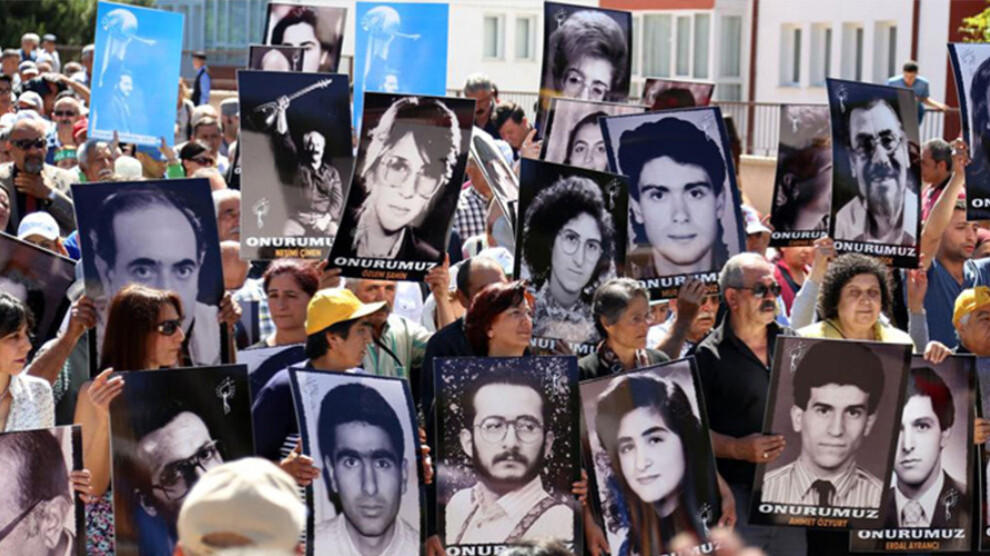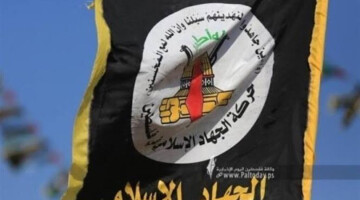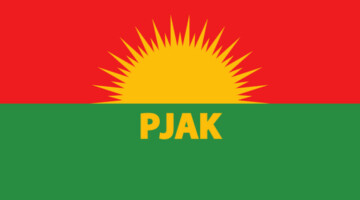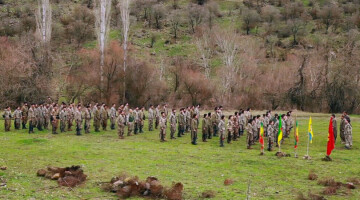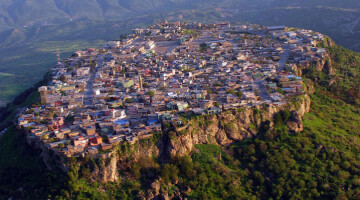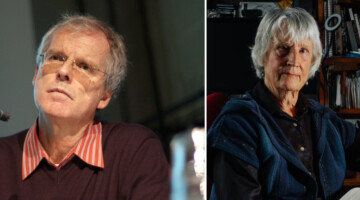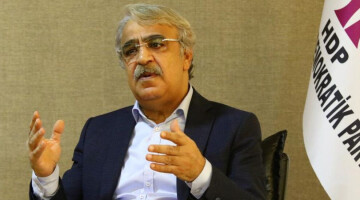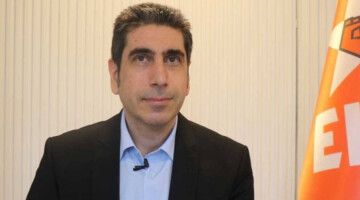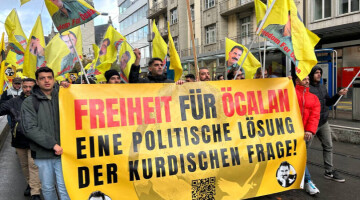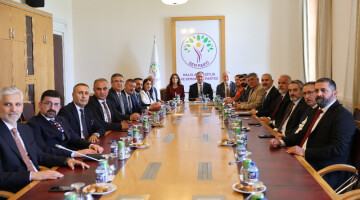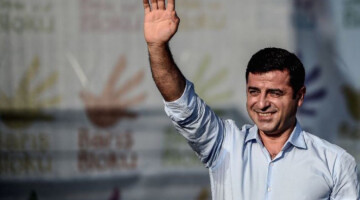Thirty years ago, an anti-Alevi pogrom took place in Sivas. The massacre on 2 July 1993 was directed against participants of a cultural festival that was organised in honour of the Alevi folk poet Pir Sultan Abdal in the central Anatolian city. The guests of the festival, who stayed at the Madımak Hotel, were mainly Alevi artists; poets, thinkers, singers and folklore dancers, but also critical intellectuals of different denominations.
A religiously and nationalistically incited mob used, among other things, the presence of the avowed atheist and well-known writer Aziz Nesin as a pretext to set fire to the hotel. The trapped people could not escape from the burning building because the angry mob blocked their way and cheered the fire. Although the police, military and fire brigade were alerted, they did not intervene until hours later. The events were broadcast live on state television for hours. 35 people, including two hotel employees, died in the fire at the Madımak Hotel.
The Kurdistan Communities Union (KCK) released a statement remembering the victims and detailing the background of the pogrom on the occasion of the anniversary.
"The Turkish state, which was founded on monist and genocidal foundations, was hostile to all peoples, especially the Kurds and Alevis, and aimed to eliminate them through oppression, assimilation, massacres and all methods of genocide. The Sivas massacre was also committed for this purpose and is a continuation of the massacres of the Alevis in Dersim, Maraş and Çorum.
The Alevis are a society with a faith and tradition in which there are no exploitative relations and in which communal, democratic, liberal and socialist elements prevail. Because of these characteristics, the Alevi community has been attacked and massacred by those in power throughout history. It can be said that the Alevi community is one of the communities that have suffered the most massacres and genocides in history because of its democratic, liberal and communal values. The oppression and massacres of the Alevi community have increased during the nation-state process with a monist mentality. Since the state has a monist, power-obsessed and anti-democratic mentality, it sees the Alevi community as a danger to itself and tries to eliminate the Alevi faith and culture through genocidal methods. This action of the state against the Alevi community and the Alevi faith clearly shows its genocidal face.
The monist state mentality in Turkey and Bakurê Kurdistanê [Northern Kurdistan] can only survive and secure its existence through oppression, massacres and genocide. The massacres of the Alevis show that the colonialist state is not only hostile to the Kurdish people, but also to the Alevis and all peoples. This hostility of the state towards all peoples and the genocidal reality make a democratic unity and a common struggle for rights necessary and compelling. We believe that this is one of the most important conclusions we should draw from the massacres. Because the massacres are mainly aimed at preventing democratisation and democratic change and ensuring the continuity of the monist, reactionary, fascist and anti-democratic system. The massacre in Sivas has made this reality even clearer. Leading intellectuals, writers and artists of the Alevi community, who have gained important democratic consciousness and maturity and who are leading society in the democratisation of Turkey, were targeted and massacred in order to prevent the development of a democratic struggle.
The Sivas pogrom, like other anti-Alevi massacres, was perpetrated by the state and state-organised forces. First, the environment was prepared by stirring up sectarian and religious sensitivities, and then the massacre was carried out by paramilitary fascist structures. The fact that the massacre was condoned by the rulers of the state and the perpetrators were not brought to justice and punished highlights this fact. That the policy of genocide against the Alevi community continues proves the state's connection with the massacres.
One of the most important features of the Sivas massacre was the aim to prevent the revolutionary democratic struggle developing in Kurdistan from meeting with the revolutionary democratic struggle in Turkey. The struggle that developed in Kurdistan under the leadership of our movement against the colonialist mentality and the fascist order of September 12 [1980 military coup] has taken great development in the 1990s and reached a popular democratic movement. The revolutionary struggle and the people's democratic movement that developed in Kurdistan started to positively influence the struggle in Turkey. The massacre in Sivas was meant to prevent the meeting of the struggle in Kurdistan with the struggle in Turkey and the formation of a strong democratic unity. Because Kurds and Alevis are the most fundamental dynamics in the democratisation of Turkey. The continuous massacres of Kurds and Alevis are aimed at eliminating the basic dynamics that can guarantee the democratisation of Turkey.
From the very beginning, our movement, with its struggle against the genocidal colonialist fascist mentality, has sought and strived for the democracy and freedom demands of the Kurdish people and all peoples, women and oppressed people in Turkey, especially the Alevi community. Rêber Apo [Abdullah Ocalan] has waged a very intense intellectual and practical struggle for the Kurdish Alevi people and the entire Alevi community to support their faith and identity values and to gain their freedom. He has emphasised the democratic, freedom values inherent in the Alevi faith and culture and considered it a moral, democratic and revolutionary responsibility to keep these values alive. This intensive effort of Rêber Apo has deepened the democratic character of our struggle, which advocates the coexistence of all peoples, cultures and faiths with their differences.
The fascist AKP/MHP government today stands for a massacring and genocidal mentality and policy. The unification of all reactionary, monist, fascist structures around the AKP/MHP government serves the purpose of perpetrating even greater massacres. The AKP/MHP government is already carrying out daily massacre policies against Kurds, Alevis, women, workers, labourers, intellectuals, writers and artists. The isolation and torture system in Imralı, the war against the Kurds, the oppression and attacks against Alevis, the massacres against women, the exploitation of workers and labourers, the ban on art, the imprisonment of intellectuals and journalists and the attempts to silence them should be considered as massacres. The right attitude in the face of all massacres, especially the Sivas massacre, is that those who struggle for democracy and freedom against this reactionary, monist, fascist and massacring policy of the AKP/MHP government should continue to build their democratic unity and develop the democratic struggle.
With this conviction, we would like to emphasise once again that all forces of freedom and democracy must unite even more around the principles of democratic struggle and life. This is the only way to put an end to the massacre and bring the perpetrators to justice. With this conviction, we once again reverently remember the martyrs of the Sivas massacre who were brutally and ruthlessly burnt. The memory of them will always live on in our struggle and light our way."

